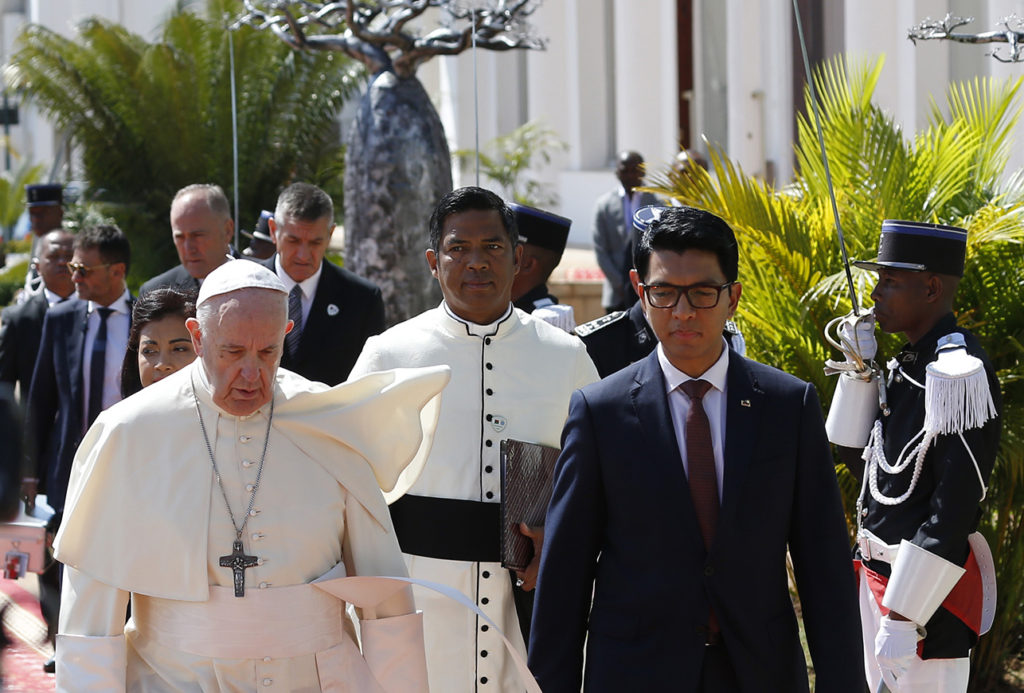
ANTANANARIVO, Madagascar (CNS) — In Madagascar, where the destruction of the environment and the suffering of the poor are inextricably bound, Pope Francis urged government officials to promote development projects that protect nature.
The crisis facing the island nation in the Indian Ocean is “both social and environmental,” the pope said Sept. 7 as he met President Andry Rajoelina, other government officials, diplomats serving in Madagascar and representatives of major aid and development agencies.
Immediately after making their speeches, the pope and president went outside the Ceremony Building and planted a baobab tree, a symbol of the island.
Although rich in natural resources, Madagascar is consistently ranked as one of the world’s 10 poorest countries. According to the World Bank, 75 percent of the population lives on less than $1.90 a day.
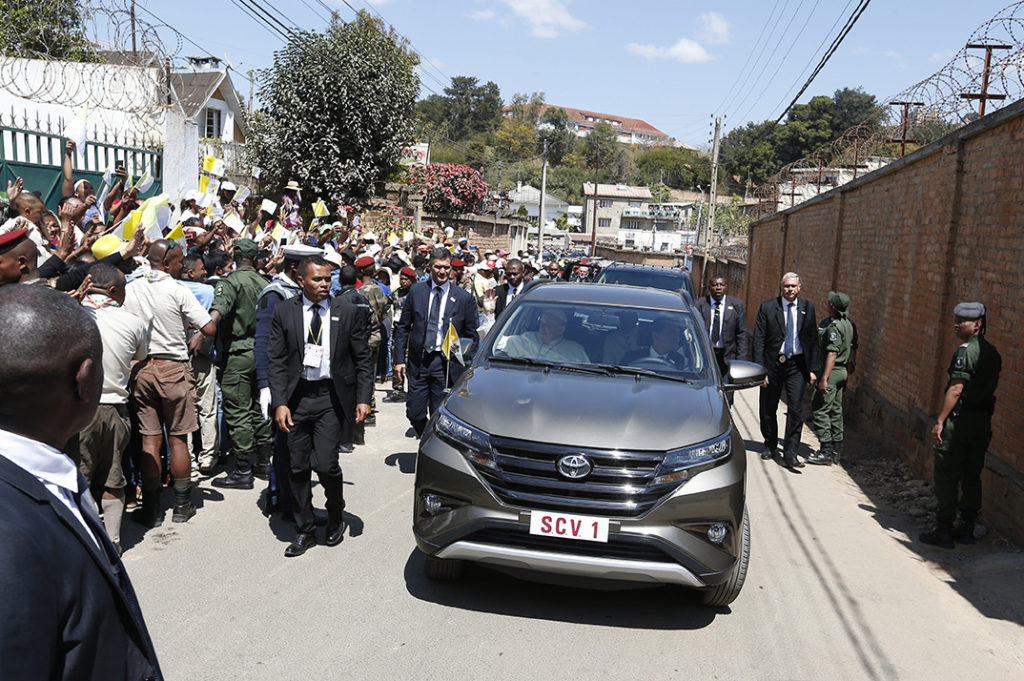

The country also is challenged by a frightening rate of deforestation as prized rosewood trees are cut down illegally and exported, mainly to China, and as other forest lands are cleared by poor farmers trying to eke out a living.
Phil Boyle, British ambassador to Madagascar, told reporters that perhaps as much as 500,000 acres of forests are lost each year. Without serious measures to stop the destruction of the forests and to begin planting trees, “then possibly the most unique habitat on earth will be lost.”
Pope Francis told the politicians and ambassadors, “We cannot speak of integral development without showing consideration and care for our common home,” which means that a way must be found to preserve natural resources, while also investing in education, health care and job creation.
“We are faced not with two separate crises, one environmental and the other social, but rather with one complex crisis which is both social and environmental,” he said, quoting “Laudato Si’,” his encyclical on “integral ecology.”
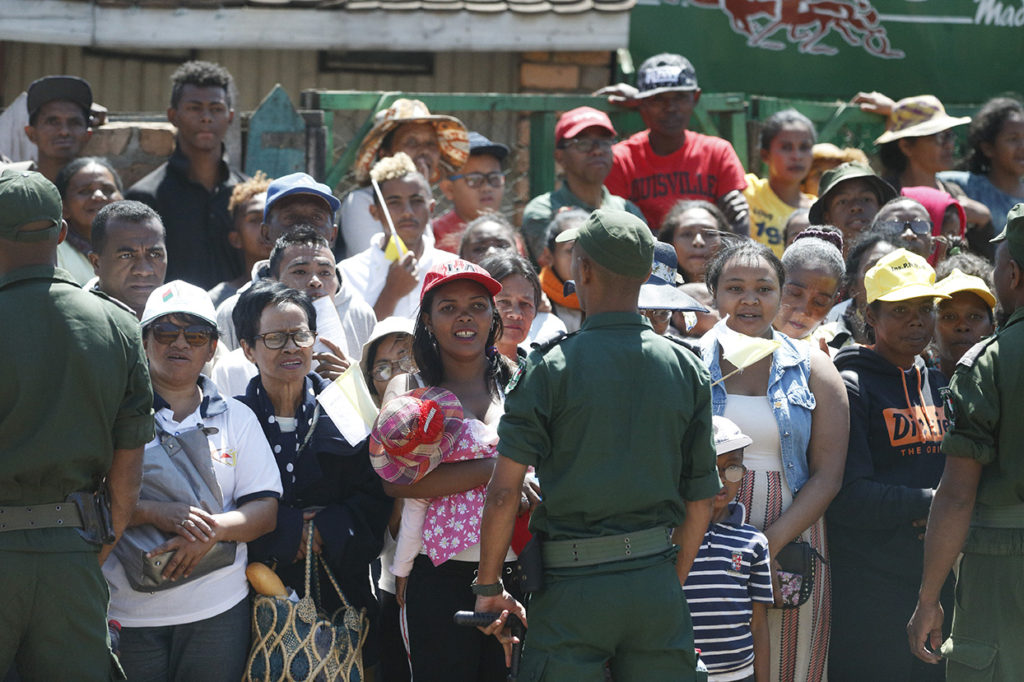

The pope gave the sisters a copy of his prepared text, then spoke extemporaneously about the importance of love and concern within religious communities, pointing particularly to the life of St. Thérèse of Lisieux as a model.
The pope was plainspoken in his speech, pointing out how “the last forests are menaced by forest fires, poaching (and) the unrestricted cutting down of valuable woodlands. Plant and animal biodiversity is endangered by contraband and illegal exportation,” which benefit the rich and powerful.
At the same time, he acknowledged how, for the poor, “a number of activities harmful to the environment at present ensure their survival. So,” he said, “it is important to create jobs and activities that generate income, while protecting the environment and helping people to emerge from poverty.”
“In a word,” he said, “there can be no true ecological approach or effective efforts to safeguard the environment without the attainment of a social justice capable of respecting the right to the common destination of earth’s goods, not only of present generations, but also of those yet to come.”
After fulfilling the required protocol obligations with the government leaders, Pope Francis went to a Discalced Carmelite monastery to meet about 100 nuns representing the island’s contemplative communities.
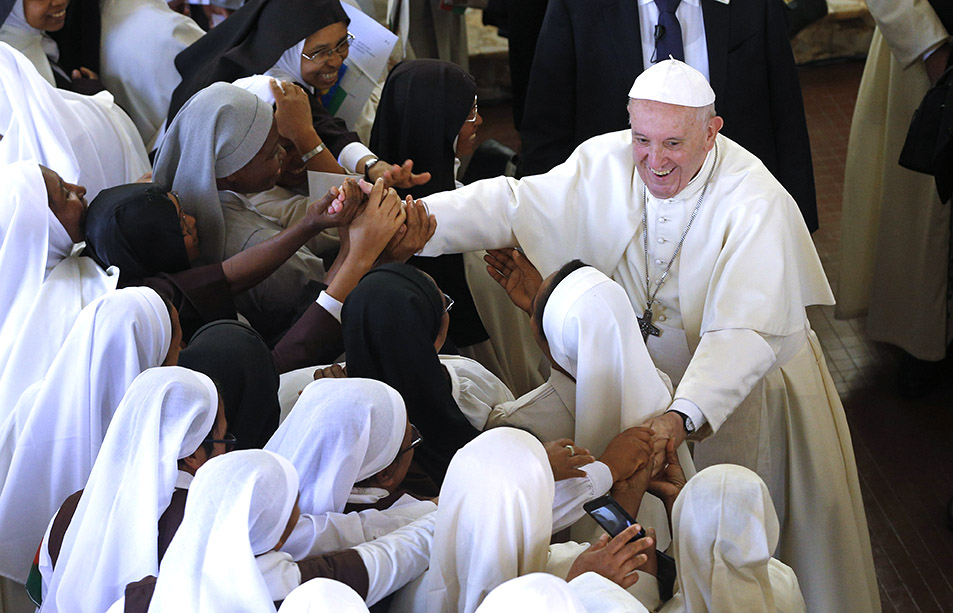

But then he began speaking about how the grill that separates cloistered nuns from the outside world does not always protect them either from “worldliness” or from those who want to harm them.
“Always transparency!” the pope said, telling the sisters that if they are troubled by someone who wants to “disturb your tranquility,” including if it is their spiritual director, they should tell their superior. The pope was not more specific.
“Please, dear sisters, if you hear of something strange happening, tell someone immediately. Immediately,” Pope Francis said.
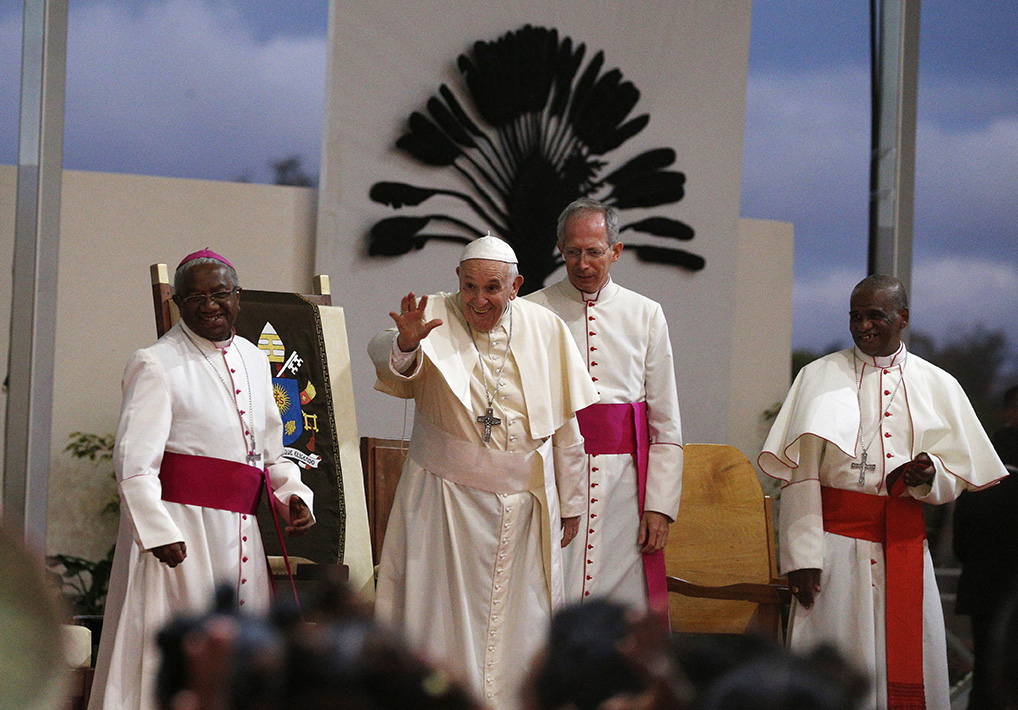

Change the world, don’t just gripe about it, pope tells young people
Later that evening, at a vigil on the wide-open diocesan field at Soamandrakizay, Pope Francis told young people that following Jesus means growing in friendship with him and with one’s brothers and sisters, never being content with the way things are, but not just griping about them either.
Jesus calls His disciples “to be on the move, acting, committed, certain that the Lord is supporting and accompanying them,” he told the teens and young adults from across Madagascar.
Tens of thousands of people of all ages were gathered for the vigil; the older folks came because the pope was scheduled to celebrate Mass there the next morning.
With straw mats and plastic tarps, blankets or sleeping bags, jugs of water and bags of food, it seemed that everyone was planning to spend the night.
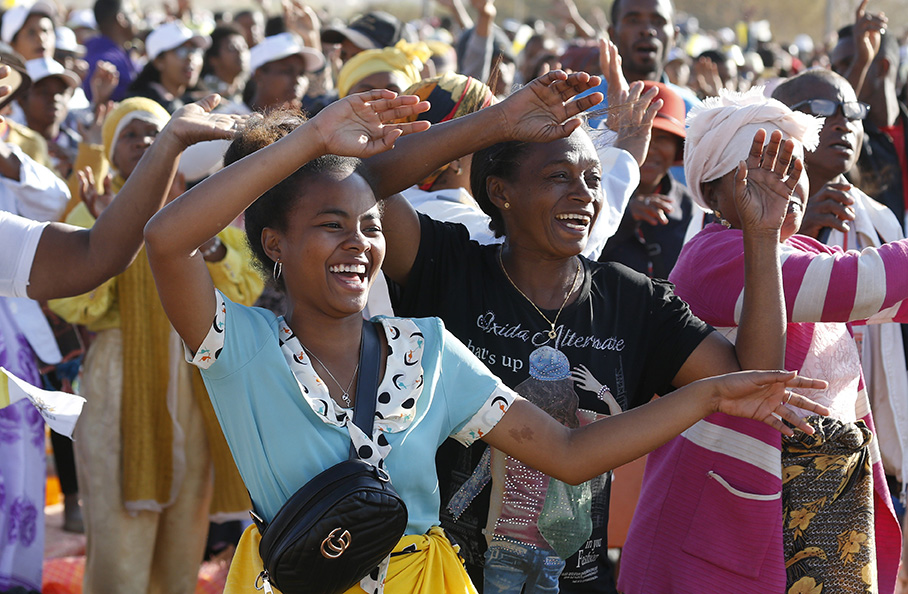

Trinitarian Sister Jeannine Raivomanana, a young sister who was with three others from her order, said, “Since Pope Francis is coming here, we will stay.”
Mihaje Andrianera, 20, was there with her 18-year-old sister, Fara. “When I heard the pope was coming, I knew it was an opportunity. I mean, I just had to be here.”
Fara added, “This is the only time in our lives we will see him.”
The pope arrived as the winter sun was setting; the young people kept singing and dancing as Pope Francis toured the crowd in the popemobile.
Speaking in Italian, with a priest translating into Malagasy, the pope told the young people he knew that, deep down, they all were searching for a happiness that no one could take from them.
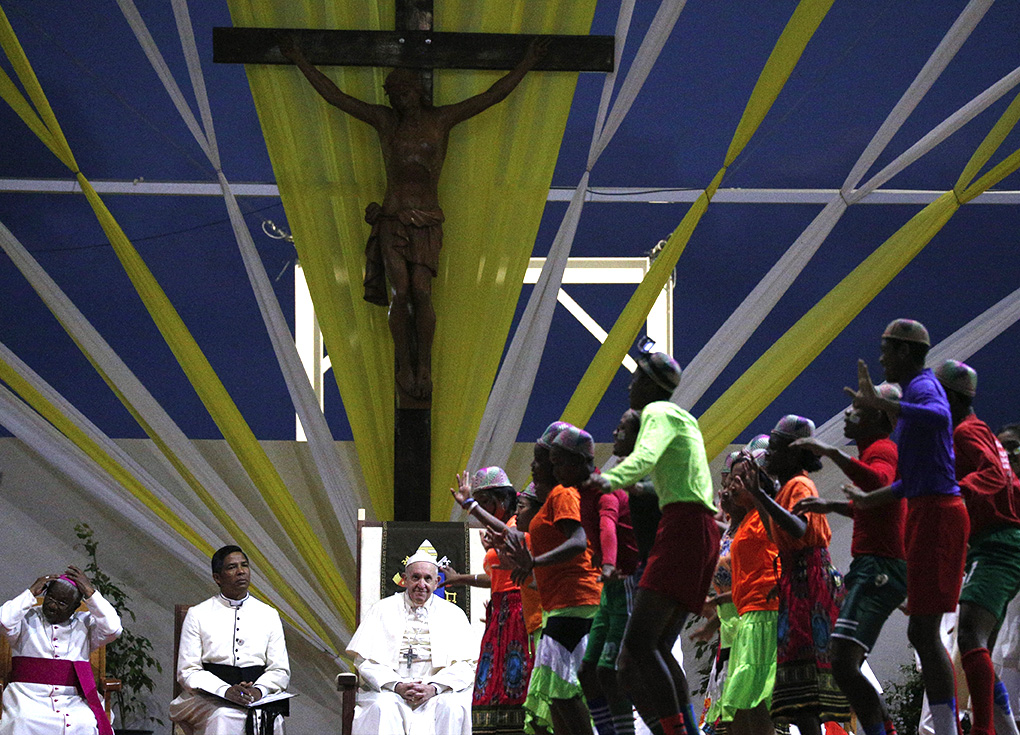

Sometimes, he said, it will be tempting to give up hopes and dreams for a meaningful life and for a more just world, “especially when you lack the bare necessities to make it from day to day or to pursue your studies, or when you realize that without a job, stability and social injustice, your future is blocked.”
Jesus calls each person to move forward and to find ways to make a contribution to improving society, he said.
However, the pope said, “The Lord is not looking for lone adventurers. He gives us a mission, yes, but He does not send us out alone to the frontlines.”
“It is impossible to be a missionary disciple all by ourselves,” he said. “Certainly, we can accomplish great things on our own, but together we can dream of and undertake things undreamt of!”
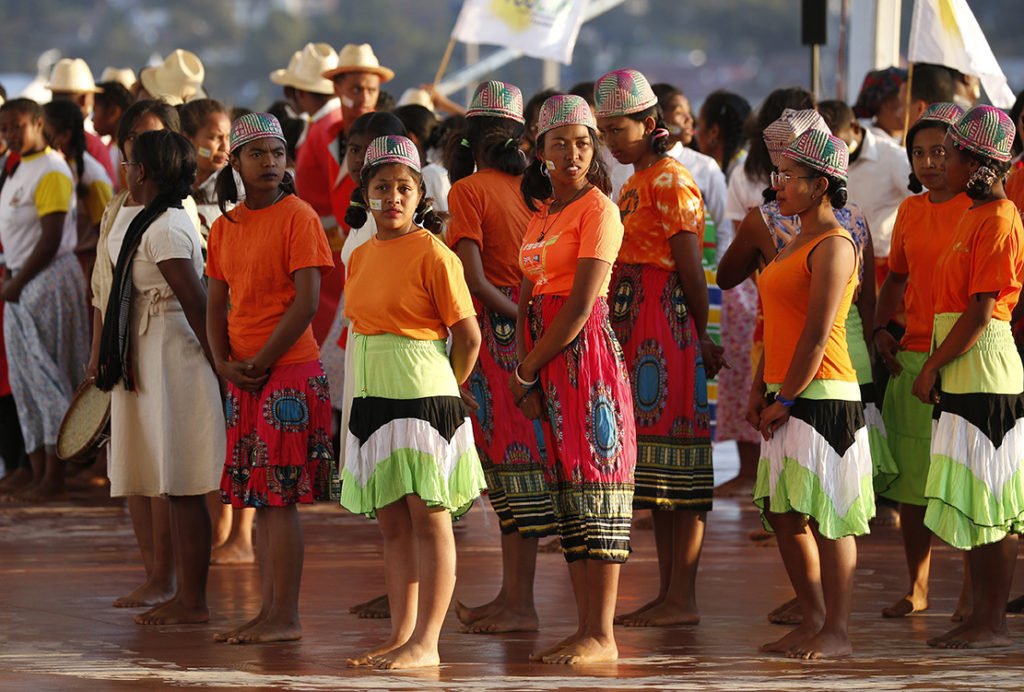

Pope Francis also urged the young people to remember how much God loves them and how He calls them to love others, including those society scorns.
God “does not call us by our sins, our errors, our faults, our limits, but by our name; each of us is precious in His eyes,” he said.
“The devil also knows our names,” the pope said, but he tends to call people by a label based on their “sins and errors; in this way, he makes us feel that however much we do, nothing can ever change, everything will remain the same. The Lord will have none of that. The Lord always reminds us how precious we are in His eyes, and He entrusts us with a mission.”
Pope Francis asked the young people of Madagascar to respond to God’s call like Mary did, by saying “yes” and setting off. “It is the ‘yes’ of all those willing to commit themselves and take risks, ready to stake everything, with no guarantee except the sure conviction of knowing they are bearers of a promise.”
— By Cindy Wooden, Catholic News Service.





